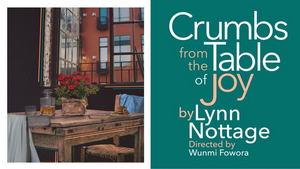Feature: LCR presents CRUMBS FROM THE TABLE OF JOY
Remote theatre company Local Classic Repertory presents a digital version of Lynn Nottage's CRUMBS FROM THE TABLE OF JOY.

Crumbs from the Table of Joy by Lynn Nottage is a 1995 play about a Brooklyn-based family in the 1950s. Crumbs features Godfrey Crump and his two teenaged daughters. Dealing with the loss of their mother, Godfrey brings home a new wife, a German woman. At the dawning of the Civil Rights Era, the 1950s were a turning point for Black American families. Of this play, which takes a peek at a vibrant and multi-faceted family during an important time in American culture, playwright Nottage has said "The 1950s was such a moment in American history in which I felt so much change...everything I had seen was in black and white. And I wanted to make it colorful. So I started writing Crumbs from the Table of Joy to try to understand that era."
The 1950s is a decade and period of American History that continues to be White-Washed. Often left out of a glossed over narrative of Americana is the truth lived by thousands of Black families. Crumbs features a true to life American Black family and gives voice to a generation that has long been ignored, and continues to be even in our culture today.
Local Classic Repertory offers this production as a part of their virtual season. Crumbs from the Table of Joy is directed by Wunmi Fowora, with costume design by Nandi Mudiwa Anyabwile. Fowora was gracious enough to provide an exclusive Q&A with Broadway World. Her interview is below:
BWW: Tell us about Crumbs from the Table of Joy! What are you hoping audiences will get to experience with this play?
WF: Crumbs From the Table of Joy is a superb inside account of a reserved Black family from Florida dealing with and finding the many surprises of living in 1950s Brooklyn, New York. The play is primarily told from the point of view from the family's eldest, an imaginative teenage girl by the name of Ernestine Crump. I want when an audience member watches this show to first see the love within this humble home and also feel moved by the story's audacity to speak even in 2020 the truth about how we view working class people and Blackness.
BWW: How has directing a digital show been challenging and/or rewarding? Have you grown as an artist during this process?
WF: I feel so honored to be directing a show by one of my favorite playwrights, Lynn Nottage. That has only made me more motivated to put this production together with the help of Local Classic Repertory, who has been a sincere fighter and support system for me in this process. Directing digitally has had its ups and downs- it's amazing how you can still get so connected to cast members and they find intimacy in the rehearsal process, sometimes hundreds of miles away from one another. However, dealing with technical issues like the internet connection failing, screen glitches and not being able to complete certain actions, even if the script tells my actors to do it, made it challenging in our rehearsals. But overall, I feel these trials and tribulations forced me to create better solutions and pushed me to be innovative.
BWW: What are you hoping the future looks like for the arts after the pandemic?
WF: I hope after the pandemic, that more lovers of theatre watch more plays written and directed by Black playwrights. Black folks have been saying forever that White people, and other non-Black people, have been perpetually getting our stories wrong, and it's about time we have more agency and room for our brown bodies to take up space and offer our nuance in storytelling to the world around us- the world may learn something new.
BWW: Why do you think it's so important to represent ALL people in theatre?
WF: Imagine a world where all the important and most powerful people in the world looked and spoke nothing like you and then further decided to not include giving people who look like you opportunities to thrive in their rules, laws and standards of beauty. That is what many BIPOC people feel. That is what many differently abled people feel. That is what many in the LGBTQIA community feel. And we have also known and tasted the repercussions of exclusion. It's important to represent all types of people in theatre so we can see the world we live around us as we see it and also what we can imagine it to be. I am so excited and looking forward to what new art has to offer us in these next upcoming years post-COVID-19 shutdowns. I hope when we get a chance to see theatre in person again, that it will have left space for more communities of people who often never highlighted. And we get to now see them being the heroes and heroines of their own stories with nuance and grace in this unnecessarily hyper Western & Eurocentric environment, that almost implies this monolithic experience one should have. Produce more art including ALL people, the world around us will finally be exposed to the humanity of ALL people.
* * *
Crumbs from the Table of Joy runs October 15th - 18th on Local Classic Repertory's virtual platform. To purchase tickets and access the show, visit local-classic-repertory.mn.co.
Follow Melissa Campbell on Instagram: @melissareneecampbell.
Comments
Videos

